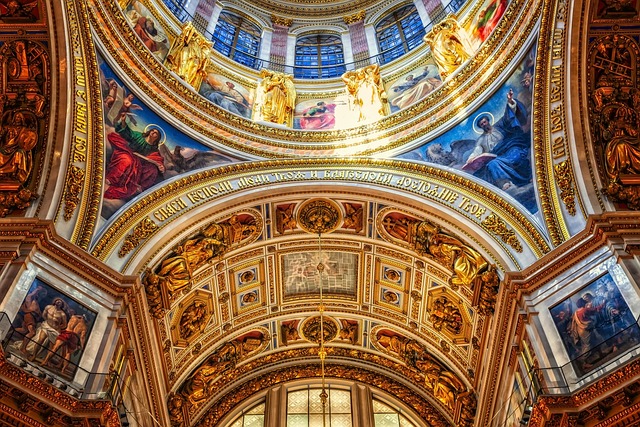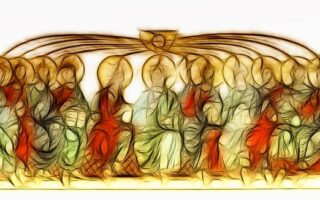Orthodox services are commonly referred to as Divine Liturgy or the Holy Eucharist.
Table of Contents
Understanding the Divine Liturgy: A Guide to Orthodox Services
Orthodox Christianity is a rich and ancient tradition that has been passed down through the centuries. One of the most important aspects of Orthodox worship is the Divine Liturgy, a sacred service that is central to the life of the Church. But what exactly are Orthodox services called? In this article, we will explore the different types of services that are commonly celebrated in the Orthodox Church.
The most well-known and frequently celebrated service in the Orthodox Church is the Divine Liturgy. This is the primary worship service where the faithful gather to partake in the Eucharist, or Holy Communion. The Divine Liturgy is a beautiful and solemn service that is filled with prayers, hymns, and readings from the Holy Scriptures. It is a time for the faithful to come together as a community and to receive the body and blood of Christ.
In addition to the Divine Liturgy, there are other services that are celebrated throughout the year. One of these is Vespers, which is an evening prayer service. Vespers is typically held on Saturday evenings and is a time for the faithful to gather and prepare themselves for the Sunday Liturgy. It is a service of thanksgiving and praise, where the faithful offer prayers and hymns to God.
Another important service in the Orthodox Church is Matins, which is a morning prayer service. Matins is typically held before the Divine Liturgy and is a time for the faithful to gather and prepare themselves for the Eucharist. It is a service of repentance and supplication, where the faithful offer prayers and hymns to God, seeking His mercy and forgiveness.
During the Great Lent, the Orthodox Church celebrates the service of the Presanctified Liturgy. This is a unique and solemn service that is held on Wednesdays and Fridays during Lent. The Presanctified Liturgy is a time for the faithful to receive Holy Communion, but unlike the Divine Liturgy, the Eucharist is consecrated beforehand and reserved from the previous Sunday. This service is a time for reflection and repentance, as the faithful prepare themselves for the crucifixion and resurrection of Christ.
In addition to these services, there are also special services that are celebrated on feast days and other important occasions. These services may include the Akathist Hymn, a service of praise and thanksgiving, or the Paraklesis, a service of supplication and intercession. Each of these services has its own unique prayers, hymns, and rituals, but they all share the common goal of bringing the faithful closer to God.
In conclusion, Orthodox services are called by different names depending on the specific type of service being celebrated. The most well-known and frequently celebrated service is the Divine Liturgy, where the faithful partake in the Eucharist. Other services include Vespers, Matins, and the Presanctified Liturgy, each with its own unique purpose and significance. These services, along with special services celebrated on feast days, are an integral part of Orthodox worship and provide the faithful with opportunities for prayer, reflection, and communion with God.
Exploring the Rich Traditions of Orthodox Worship: An Introduction to Divine Services

Orthodox Christianity is known for its rich and ancient traditions, and one of the most important aspects of these traditions is the divine services. These services are the heart and soul of Orthodox worship, and they play a central role in the spiritual life of Orthodox Christians. In this article, we will explore what these services are called and provide an introduction to the beauty and significance of Orthodox worship.
The divine services in the Orthodox Church are commonly referred to as the “Divine Liturgy.” This term comes from the Greek words “Theia Leitourgia,” which means “the work of the people.” This name reflects the belief that the divine services are not just a passive observance, but an active participation of the entire congregation in the worship of God.
The Divine Liturgy is the most important and central service in Orthodox worship. It is a celebration of the Eucharist, the sacrament of the body and blood of Christ. During the Divine Liturgy, the faithful gather together to offer prayers, sing hymns, and partake in the Holy Communion. It is a time of deep reverence and awe, as Orthodox Christians believe that they are truly encountering the presence of Christ in the Eucharist.
In addition to the Divine Liturgy, there are also other services that are an integral part of Orthodox worship. One of these is the “Vespers,” which is a service of evening prayer. Vespers is typically held in the late afternoon or early evening and is a time of reflection and preparation for the coming day. It includes psalms, hymns, and prayers, and often concludes with the lighting of candles and the singing of the hymn “O Gladsome Light.”
Another important service is the “Matins,” which is a service of morning prayer. Matins is usually held in the early morning hours and is a time of spiritual awakening and preparation for the day ahead. It includes psalms, hymns, and prayers, and often includes readings from the Scriptures. Matins is followed by the Divine Liturgy, which is the culmination of the morning worship.
In addition to these regular services, there are also special services that are held throughout the year to commemorate important events in the life of Christ and the saints. These include the “Great Feasts” such as Christmas and Easter, as well as the “Lenten Services” during the period of fasting and repentance leading up to Easter. These special services are marked by their solemnity and beauty, with elaborate rituals and hymns that reflect the significance of the occasion.
Orthodox worship is characterized by its reverence, beauty, and sense of timelessness. The services are conducted in a language that is often ancient and poetic, and the music is rich and melodic. The use of icons, incense, and candles adds to the sensory experience of worship, creating an atmosphere of holiness and awe.
In conclusion, the divine services in the Orthodox Church are called the Divine Liturgy, and they are the heart and soul of Orthodox worship. These services, including the Vespers, Matins, and special services, are a time of active participation and encounter with the presence of Christ. They are marked by their reverence, beauty, and sense of timelessness, and they play a central role in the spiritual life of Orthodox Christians.
Unveiling the Mysteries: A Closer Look at Orthodox Liturgical Services
Orthodox Christianity is a rich and ancient tradition that has captivated the hearts and minds of believers for centuries. At the center of this tradition are the liturgical services, which are a unique and integral part of Orthodox worship. These services, often referred to as the Divine Liturgy, are a beautiful and mystical experience that transport the worshipper into the presence of God.
The Divine Liturgy is the most important and well-known of the Orthodox services. It is a celebration of the Eucharist, the sacrament of Holy Communion, in which the faithful partake of the body and blood of Christ. The Liturgy is a carefully choreographed and deeply symbolic service that follows a set order and includes prayers, hymns, scripture readings, and the consecration of the bread and wine.
Another important service in the Orthodox tradition is Vespers. Vespers is an evening prayer service that takes place at sunset and marks the beginning of a new liturgical day. It is a time of reflection and preparation for the coming day, as well as a time to give thanks for the blessings of the day that has passed. Vespers includes psalms, hymns, and prayers, and often includes the lighting of candles and the offering of incense.
Matins is another significant service in the Orthodox tradition. It is a morning prayer service that takes place before the Divine Liturgy and prepares the worshipper for the Eucharist. Matins is a time of spiritual awakening and renewal, as the faithful gather to offer their prayers and praises to God. The service includes psalms, hymns, and scripture readings, as well as the chanting of the Canon, a series of poetic prayers that reflect on the theme of the day.
The Hours are shorter services that are held throughout the day and serve as a way to sanctify time and bring the faithful into communion with God. The Hours are typically held in the morning, midday, and evening, and consist of psalms, prayers, and scripture readings. These services provide a moment of pause and reflection in the midst of a busy day, allowing the worshipper to refocus their attention on God and seek His guidance and grace.
In addition to these main services, there are also a number of other services that are celebrated throughout the year in the Orthodox tradition. These include the Great Feasts, such as Christmas and Easter, as well as special services for saints and martyrs. Each of these services has its own unique prayers, hymns, and rituals, but all share the common goal of bringing the faithful into communion with God and deepening their relationship with Him.
Orthodox liturgical services are a treasure trove of spiritual riches, offering believers a glimpse into the heavenly realm and a taste of the eternal. They are a time of worship, prayer, and contemplation, where the faithful can draw closer to God and experience His presence in a profound and transformative way. Whether it is the Divine Liturgy, Vespers, Matins, or the Hours, each service has its own beauty and significance, and together they form a tapestry of worship that has been handed down through the ages. So, the next time you find yourself in an Orthodox church, take a moment to immerse yourself in the mystery and wonder of these ancient services, and allow yourself to be transported into the presence of God.
The Beauty of Orthodox Worship: Discovering the Significance of Divine Services
Orthodox worship is a rich and vibrant experience that has been passed down through the centuries. It is a beautiful tapestry of prayers, hymns, and rituals that transport the worshipper into a realm of divine encounter. But what are these services called? In this article, we will explore the significance of Orthodox services and how they are referred to within the tradition.
At the heart of Orthodox worship are the Divine Services. These services are a central part of the Orthodox Christian faith and are conducted in churches all around the world. They are a time for the faithful to come together and offer their prayers and praises to God. The Divine Services are a unique blend of liturgical elements, including prayers, scripture readings, and hymns, all carefully crafted to create a sacred atmosphere.
One of the most important Divine Services in the Orthodox tradition is the Divine Liturgy. This service is the pinnacle of Orthodox worship and is celebrated every Sunday and on major feast days. The Divine Liturgy is a reenactment of the Last Supper, where Christ instituted the Eucharist. It is a deeply meaningful and transformative experience for Orthodox Christians, as they partake in the body and blood of Christ.
Another significant service in the Orthodox tradition is Vespers. Vespers is an evening prayer service that takes place at sunset. It is a time for the faithful to gather and offer their prayers of thanksgiving and supplication. Vespers is characterized by its beautiful hymns and psalms, which create a peaceful and contemplative atmosphere. It is a time to reflect on the day that has passed and prepare for the night ahead.
Matins is another important service in the Orthodox tradition. It is a morning prayer service that takes place before the Divine Liturgy. Matins is a time for the faithful to awaken their souls and prepare themselves for the day ahead. It is a service filled with hymns and prayers, as well as readings from the Psalms and the Gospel. Matins is a time of spiritual renewal and a reminder of the new mercies that God offers each day.
In addition to these services, there are also other services that are celebrated throughout the year. These include the Great Compline, the Akathist Hymn, and the Paraklesis. Each of these services has its own unique significance and purpose within the Orthodox tradition. They provide opportunities for the faithful to deepen their relationship with God and to seek His guidance and grace.
Orthodox services are not just a series of rituals and prayers; they are a means of encountering the divine. They are a time for the faithful to enter into the presence of God and to experience His love and mercy. The beauty of Orthodox worship lies in its ability to transport the worshipper into a realm of spiritual transcendence.
In conclusion, Orthodox services are a vital part of the Orthodox Christian faith. They are a time for the faithful to gather and offer their prayers and praises to God. Whether it is the Divine Liturgy, Vespers, Matins, or any other service, each has its own unique significance and purpose. These services are not just rituals; they are a means of encountering the divine and experiencing the beauty of Orthodox worship. So, the next time you attend an Orthodox service, take a moment to appreciate the rich tapestry of prayers, hymns, and rituals that make up this sacred tradition.
Conclusion
In conclusion, Orthodox services are commonly referred to as Divine Liturgy or the Holy Eucharist.
For licensing reasons, we must provide the following notice: This content was created in part with the help of an AI.


